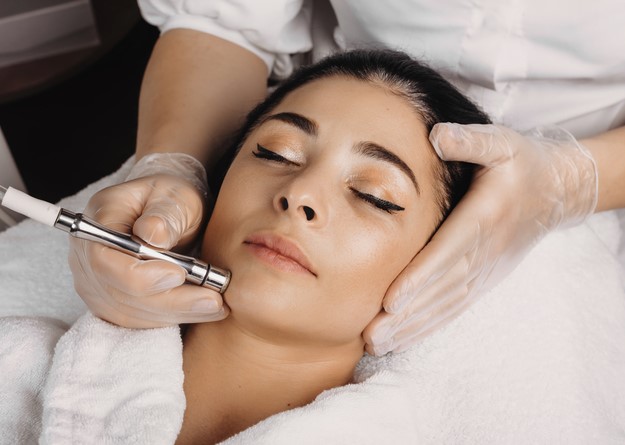
It feels good to spend time in the sunshine, but it can take a toll on your skin.
That’s because the sun gives off ultraviolet (UV) light that damages your skin and causes sunburn. Over time, these rays can lead to wrinkles, dark spots, and other problem areas. The result: you can add years to your looks. Research shows that UV exposure is the reason behind 80% of your skin’s aging.
Is there any way you can turn back the clock? Fortunately, experts are shedding light on ways you can reverse some problems caused by the sun. It’s not possible to erase all the damage, but there are some steps you can take for these common conditions. Here at The Aesthetic Center by Medical Associates, we can treat sun damaged skin using a variety of techniques, including laser treatments and products that can help diminish the outward effects of sun damage.
COMMON SIDE EFFECTS OF SUN DAMAGE AND TREATMENT OPTIONS:
Sunburn
By the time your skin turns pink and painful, most of the harm is already done. Sunburns happen when there’s damage to the DNA in your skin cells. Over time, these injuries add up and lead to physical changes like wrinkles and skin cancer.
While there are plenty of things you can do to ease the pain, there are only a few ways you can counteract the damage before it’s there for good. Wear a broad-spectrum sunscreen – and reapply it at least every 80 minutes – and try to stick to the shade. You’ll protect yourself from future UV radiation and give your skin’s enzymes time to repair some of the damaged DNA.
Dry Skin
The sun can parch your skin, leaving you with rough patches. But you don’t have to be stuck with the lizard look. Use a scrub or loofah to gently exfoliate and remove the top layer of dead skin cells to reveal the soft skin beneath. Then, moisturize with lotion. If you’re sunburned, skip petroleum-based products, as they trap in heat. Also drink plenty of water during the day.
Wrinkles
UV rays can break down collagen and elastin, two proteins that keep skin firm and smooth. Try these treatments to iron out those wrinkles:

HEALTHY HABITS TO PREVENT AND REVERSE SUN-DAMAGED SKIN
Get Checked Out by a Dermatologist
If sun damage gives you any new or changing marks on your skin, let your dermatologist know, as it could be a sign of skin cancer. Protect yourself from future UV harm with sun-safe habits. Avoid the sun between 10 AM and 3 PM. Wear protective clothing and a broad-spectrum sunscreen with an SPF of at least 30. Be sure to reapply every 80 minutes when out and after swimming and sweating.
Catch More ZZZs
The idea that you can sleep away your skin troubles isn’t far-fetched. Nighttime is when skin does the bulk of its repair work, such as making new cells and mending or shedding old, damaged ones. This is also when it makes the most of any creams and lotions you apply. Skin gets warmer at night, so products seep in better and yield faster results. Aim to snooze for at least 7 hours a night. In one study, women who slept 7 to 9 hours a night looked younger, had more hydrated skin, and were happier with their looks than those who slept only 5 hours.
Eat to Beat Skin Aging
Nutrition is just as important for your skin as it is for the rest of your body. In one study, people with sun damage who ate more vegetables, olive oil, fish, and legumes – and less butter, meat, dairy, and sugar – had fewer wrinkles. The results were similar for women with diets high in vitamin C, like citrus fruits, broccoli, strawberries, and leafy greens. Vegetable oils, nuts, and seeds have another nutrient, a fatty acid called linoleic acid, which moisturizes skin. And since antioxidants offer UV protection from the inside out, foods high in lycopene (tomatoes), polyphenols (green tea), and flavanols (cocoa) can be part of your skin-saving strategy.
Get Moving
When you boost your heart rate and blood flow, you help your body undo skin aging by delivering more nutrients to cells that repair damage. A sweat session also makes your skin tauter and more toned. Want proof? In a recent study, researchers found that people over 40 who were active for at least 3 hours a week had skin that was similar to that of people in their 20s and 30s – even in someone up to age 65. As a bonus, exercise also helps you keep a healthy weight, which is key since extra pounds weaken your skin’s support structure and lead to sagging.
Slash Stress
Inner turmoil takes a huge toll on skin. One of the reasons is because stress increases the hormone cortisol, which keeps skin from holding on to water and triggers a spike in blood sugar that damages collagen and elastin. Any type of exercise can tame tension, but yoga seems to be an especially good way to lower cortisol levels.
Drink less alcohol
Sure, alcohol has antioxidants that help protect skin from damage, but it’s high in sugar, too. When you consume too much, it triggers a process called glycation that destroys collagen and elastin. It also zaps your skin’s hydration, which makes wrinkles more noticeable, and causes spidery capillaries to show up on your face. For most people however, a daily beer or glass of wine won’t have a visible effect on skin.
If you have damaged skin due to sun exposure, The Aesthetic Center by Medical Associates can help! Call 563-584-3444 today for a free consultation.
Source: https://www.webmd.com/melanoma-skin-cancer/skin-sun-damage-treatment